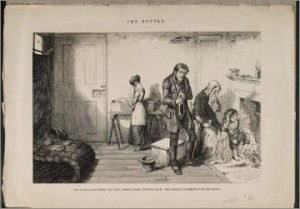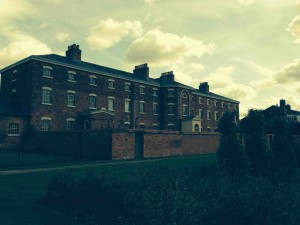Archive for: workhouse
Pop up paupers, pathways and pauper mice at the Workhouse, Southwell
Post by Jenny Hughes On Sunday 24th August I went with Carran Waterfield from Triangle Theatre to the Workhouse at Southwell (Nottinghamshire). The workhouse was bought by the National Trust in 1997 and renovated with loving care and no expense spared to a condition as close to the original as possible, opening […]
Songs and recitations in the workhouse – ‘A Fine Old English Gentleman’
Post by Jenny Hughes As noted in ‘The only way is Rochdale 3’ (blog post below) – the Orpheus Glee club performed at the opening of Dearnley workhouse in Rochdale and at the Christmas treat for paupers that followed a week or so later, and their repertoire may have included […]
The only way is Rochdale (3)
Post by Jenny Hughes To return to the records of entertainments taking place in Dearnley workhouse in Rochdale during the final third of the 19th century (see previous posts – The only way is Rochdale 1 and 2). I found at least one entertainment for each month of the years […]
The ethical value of theatre
Post by Jenny Hughes The editorial page of the Guardian newspaper on 31st January 1890 gave a brief account of a debate amongst the Poor Law Guardians of Bolton on ‘the ethical value of theatre – especially, of course, in its relation to the future welfare of pauper children’. Mr […]
Love on the workhouse stage
Post by Jenny Hughes The Pall Mall Gazette on 6 June 1900 included a slightly ‘arched’ report on the extraordinary care for the ‘aged poor’ in a workhouse in Copenhagen, who are provided with ‘a theatre of their own to which they may go in the evening’. To ensure readers […]
The only way is Rochdale (1) …
Post by Jenny Hughes One of the ways I am taking this research forward is to focus on a specific locality – Rochdale in Lancashire, home of the Rochdale Pioneers and the cooperative movement, and a centre of Chartist fervour leading up to and around the period of the Reform […]
Amateur performers in the workhouse
Post by Jenny Hughes This is a follow up to the post below … another debate about the ethical value of theatre in the workhouse, this time from 1894. It also provides a nice antidote to the Marylebone Guardians’ snubbing of amateur dramatics below! Here, the writer is concerned to […]


